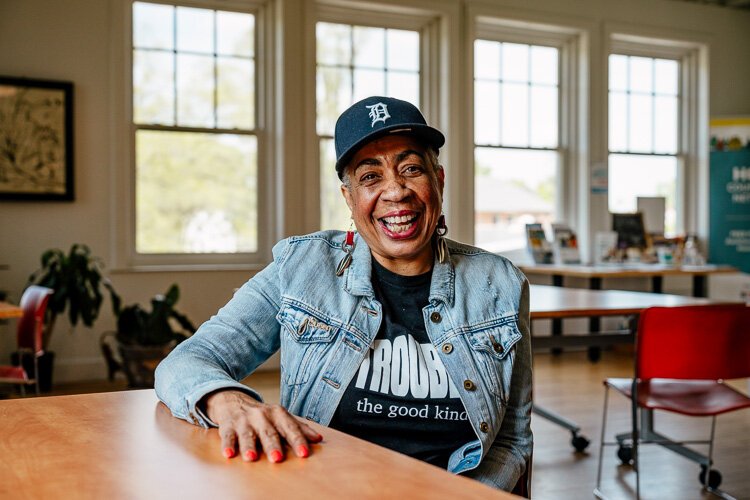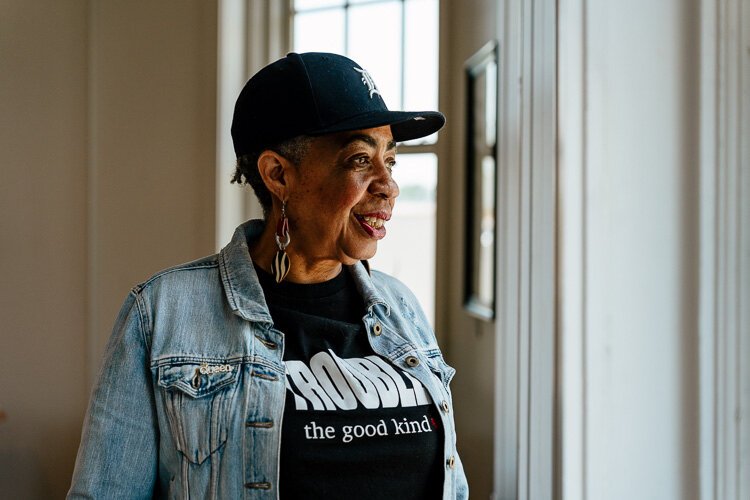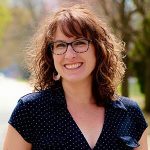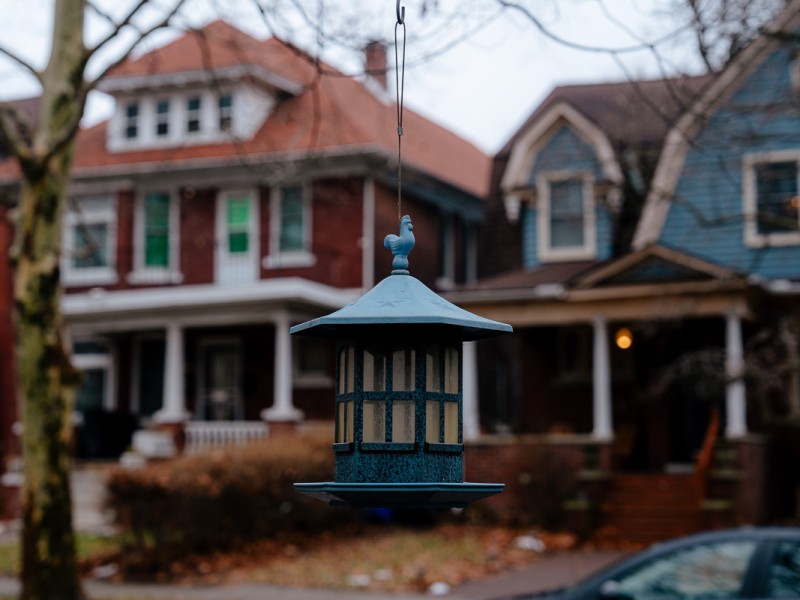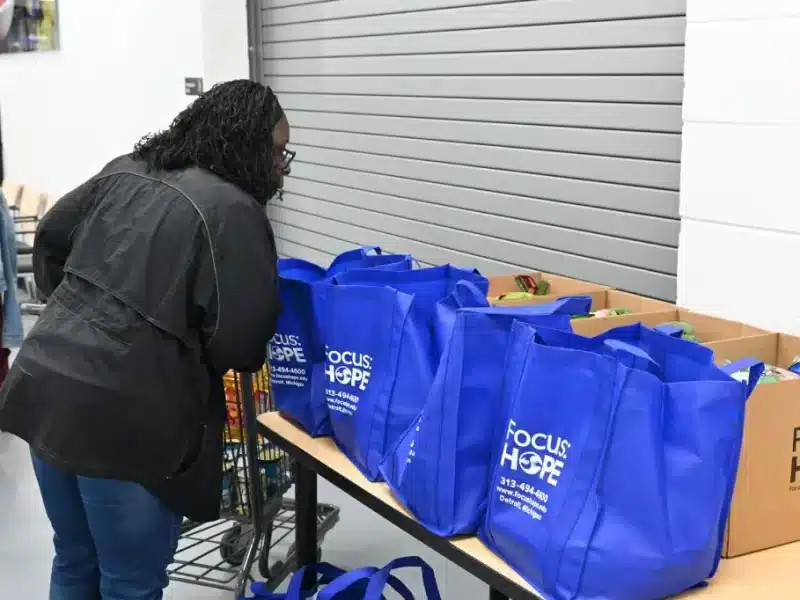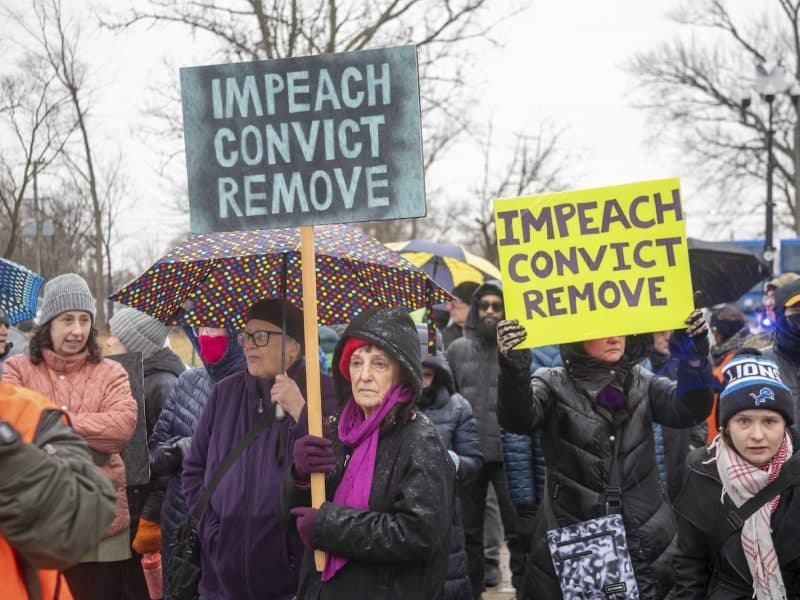Meet Edythe Ford: Welcome to the neighborhood, here are the rules
Since 1942, Edythe Ford’s family has served as the “help house” and the welcoming (and here’s what’s up) committee in the east side neighborhood of Pingree Park.
When her grandparents bought their home on Fischer Street over 80 years ago, her grandmother passed as a white woman to skirt a restrictive covenant barring a sale to Blacks. Could they have imagined their great-great-grandson growing up under its roof or how their granddaughter Edythe Ford would continue their legacy of connecting and caring for neighbors?
“I’m on the porch with it,” says Ford, 65, with a grin. Wearing a faded jean jacket, a baseball cap, and a t-shirt echoing the late civil rights legend John Lewis’s call for ‘good trouble,’” she’s equal parts grit and joy.
“I like to be on people’s porches talking to them, checking in on them. In my immediate neighborhood of Pingree Park, it’s like 2,178 families. Every day, when I walk home, I take a block. It takes me [every three months] to do the whole neighborhood. So I just take my time and go visit people.”
Ford regularly commutes home from The Commons, a coffee house, laundromat, and community space on Mack Avenue, owned and operated by MACC Development. She serves as director of community engagement and organizing at the faith-based nonprofit that works to holistically revitalize Detroit’s 48214 zip code, block by block, neighbor by neighbor.
“It is important to touch people and listen to them,” she says. “Just shut up and listen. That is the most important thing. And stop telling people what they need. That’s what keeps people angry. It’s cheaper for them to tell you what they need.”
Building relationships and facing challenges head-on has long been Ford’s approach. She returned to the city for good in 2012 after retiring from Wayne State University’s Office of Alumni Relations, earning a master’s in history, and living a short stint in the suburbs. Moving back, she found the house her grandmother left her on Fischer Street in ill repair, and blight was prevalent throughout the neighborhood.
“I noticed a lack of communication, particularly during the period of house scrapping,” she says. “It was clear to me that this chaos was a result of our silence, our failure to connect.” It wasn’t long before neighbors started asking her to help fix problems, as they knew her grandmother had done when she gave out groceries, clothes, school supplies for the kids, etc. They were big shoes to fill, but Ford stepped in.
“I started taking action because it was the norm for me,” she says, recalling how her grandparents had immersed her in civil rights protests in the South and labor union organizing by age six. Soon, she was sending volunteers to cut the lawns of senior residents and getting the cellphone numbers of local police officers so she could reach them directly about crime. It can still take dozens of her neighbors calling about the same crime or lack of city resources to get a response today.
That’s why Ford isn’t risking folks keeping to themselves.
Welcome to Pingree Park, where no man is an island
When people move in, she and neighbors walk over to meet and greet newcomers and, “while I’m here,” give the rules. These include asking folks to introduce themselves to the residents living on both sides of them and in the four houses across the street.
“Make sure you drop into the parties—take a plate, bring a plate,” Ford adds, letting people know about the fireworks contest between three streets on the Fourth of July. She suggests they have some coolers, barbecue, or hot dogs for the occasion. Particularly with white neighbors moving into the community, she emphasizes the need for residents to unwind and relax where they live.
“Black people are stressed out, and they have parties on Saturdays, and it can get loud. As long as there’s no shooting and stuff like that, don’t call the police,” she says. “If you have a problem and don’t know if you should call, call me.”
Her straight talk can shock people, but she says they call when they realize she’ll take their frustrations seriously. “I’m going to defend you. If someone’s acting crazy, and it’s someone I know, I’ll walk right over there and tell them, ‘Look, cut that out. Don’t do nothing to make the police come to the neighborhood.’”
Ford grew up in Detroit during decades of police brutality toward Blacks and the terror of STRESS and the Big Four. She says the Detroit Police Department, though not perfect, is nothing like that now, yet the neighborhood is always at risk for trauma when squad cars show up.
“You could be doing something and rightly have the police called on you, or it could be something petty, and somebody else in the neighborhood gets hurt, too. [People] start shooting, [which] can go through somebody’s house —we’ve got mostly framed houses— and we’re not doing that.”
The no-calling-the-police rule does have limits: no shooting, no breaking into people’s houses, no harming anyone. Everything else can be discussed, Ford says. When dealing with conflict, this praying woman isn’t afraid for her safety. Before addressing a problem with a neighbor, she talks to God about it.
“I’ll be like, Lord, I’m here. I’m ready to go with it right now. I walk right on over there, and it just surprises people when I show up, and they see all of this white hair. They have to take me in, and I’m like, ‘Hey, what’s going on?’”
Recently, she received 12 calls from neighbors prompting her to visit some young men in the neighborhood who were drag racing and shooting off guns with friends. When asked if she went alone, she says bringing a man along can be confrontational, which is not the goal. She keeps it simple by introducing herself, stating the neighborhood’s concerns, and clarifying that kind of thing is not welcome in the neighborhood, but all people are.
“I can’t feed your kids, so I can’t tell you what to do, but I need you to help out in the neighborhood,” she adds, suggesting someone cut the lawn of the older woman next door to avoid her getting a ticket. “I tell them if you need some help, or your kids need something, or your mom, and they live in a neighborhood, we help the 48214. Here’s all my information. Call me or come up to The Commons.”
Ford wants people in her community to have a voice, to know where the community needs to improve through their voices, and to be able to push those needs to politicians, foundations, and organizations like MACC Development and The Villages CDC, where she serves as a board member. Equally, she wants her neighbors to know how these nonprofits can help them. When she finds a new resource, she aims to “wear it out.”
Plenty of work to be done
Ford has been creating community change by helping residents alleviate their tax burdens and keep their homes through the City of Detroit’s Home Owners Property Exemption (HOPE) and the Coalition for Property Tax Justice. In the nine years she’s been working with the HOPE program, Ford says foreclosures in 48214 have decreased from 21,067 to 1,200 last year.
As a member of Detroit’s Reparations Task Force, she’s also working to develop recommendations for housing and economic development programs that address historical discrimination against the Black community in Detroit. She’s familiar with Detroit’s history but says it’s made her cry to learn how widespread the city’s racist housing practices were, affecting many people’s livelihood and generational wealth.
“In Detroit, and probably in most major cities where [there’s] a large Black population, it was just one thing after another to keep us from owning a home or keeping a home,” she says.
Ford champions an “urban renewal plan” that doesn’t displace Black people. She’s lobbying for cash grants for living descendants of Black Bottom residents, a $50,000 per-house grant program for Detroiters to make their homes healthy and climate-friendly, and an examination of the city’s housing policies and ordinances to ensure they are equitable, just to name a few.
This kind of empowerment and self-determination is why some of Detroit’s younger residents call Ford “The Queen.” She challenges them to organize and use their voices to create change if they don’t like something. She also shares stories of how many Blacks and whites stood together to fight for civil rights.
“I tell them my job as an older person is to give you my advice. How you take it and what you do with it, you do it your way, and I’m behind you.”
She may be older, but she’s not slowing down anytime soon. She considers someday starting a small consulting firm to work with businesses and government entities, going into the community, and talking with people to learn what residents need and want.
She’ll call it “Mudroots” because, at this point in her journey, “grassroots is too surface.”
Resilient Neighborhoods is a reporting and engagement series examining how Detroit residents and community development organizations work together to strengthen local neighborhoods. It’s made possible with funding from The Kresge Foundation.
